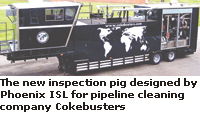Cokebusters makes clean sweep with new inspection pig
02/09/2010
 A new inspection pig designed to test the inside of oil refinery furnace tubes after cleaning has been developed by Phoenix Inspection Systems for the pipeline cleaning company Cokebusters.
A new inspection pig designed to test the inside of oil refinery furnace tubes after cleaning has been developed by Phoenix Inspection Systems for the pipeline cleaning company Cokebusters.The development represents a significant upgrade to Cokebusters’ previous inspection technology, including dramatic advances in battery power, ultrasonic accuracy, storage capacity and overall reliability. It makes Cokebusters the only company in the world which can offer decoking and accurate follow-up inspections as part of the same operation.
Cokebusters, established in 2005 by former structural engineer John Phipps, provides furnace tube and pipeline cleaning services for oil refineries around the world from its base in Chester. Refinery process tubes require regular cleaning as carbon or coke deposits build up on the tube walls. Scraper pigs are the most effective way to remove this build-up.
Cokebusters’ pigs, which have a complex laminated construction with gas-filled polymers, combine cleaning strength with flexibility to help prevent damage to walls. The pigs are forced through the network of furnace tubes by pressurised water, and the coke that is removed is filtered out and removed for safe disposal. Once decoking is complete, ultrasonic inspection can be used to check the tube wall thickness and success of the cleaning operation.
This latest development means that Cokebusters can carry out inspections as part of the whole operation by replacing the scraper pig with the inspection pig, a 16-channel flaw detector incorporating probes and instrumentation in one compact package. It can operate independently without an umbilical and log data which can then be uploaded once the inspection is complete. The pig is designed for small diameter tubing in the range of 4" to 8".
John Phipps told NDT News: “Traditionally, decoking and inspection have been carried out by two separate specialist contractors, which adds to plant downtime and makes the whole exercise more difficult to co-ordinate. There are also difficulties with the ultrasonic inspection. Often it requires a complex framework of scaffolding to be set up, and there are access problems and hazards for staff working in such environments.
“The new inspection pig overcomes these problems by allowing internal inspections driven by the same pressurised water system as the decoking pigs. It means we can integrate decoking and inspection as part of the same operation, significantly reducing downtime for plant operators. The superior design of our scraper pigs has established Cokebusters as a leader in the market and the new inspection pig will help us maintain and advance that position.”
Dr Chris Gregory of Phoenix said: “Cokebusters is an example of a company which successfully invests in technology to give it a lead in the market and this latest project will give it a further advantage over its competitors.
“The new device offers a clever solution to the problems involved in testing complex pipework systems. The technology also has a wide range of other potential uses and having the probe next to the data processing and storage instrument greatly improves detection capability. As a multi-channel flaw detector with autonomous operation, it is ideal for use in hazardous environments or indeed anywhere where there is a need for remote gathering of ultrasonic data.”
The potential for the project was identified as part of a Knowledge Transfer Partnership (KTP) in conjunction with the University of Manchester. Phoenix developed the ultrasound systems while consultant Hugh Lewis advised on electronics.